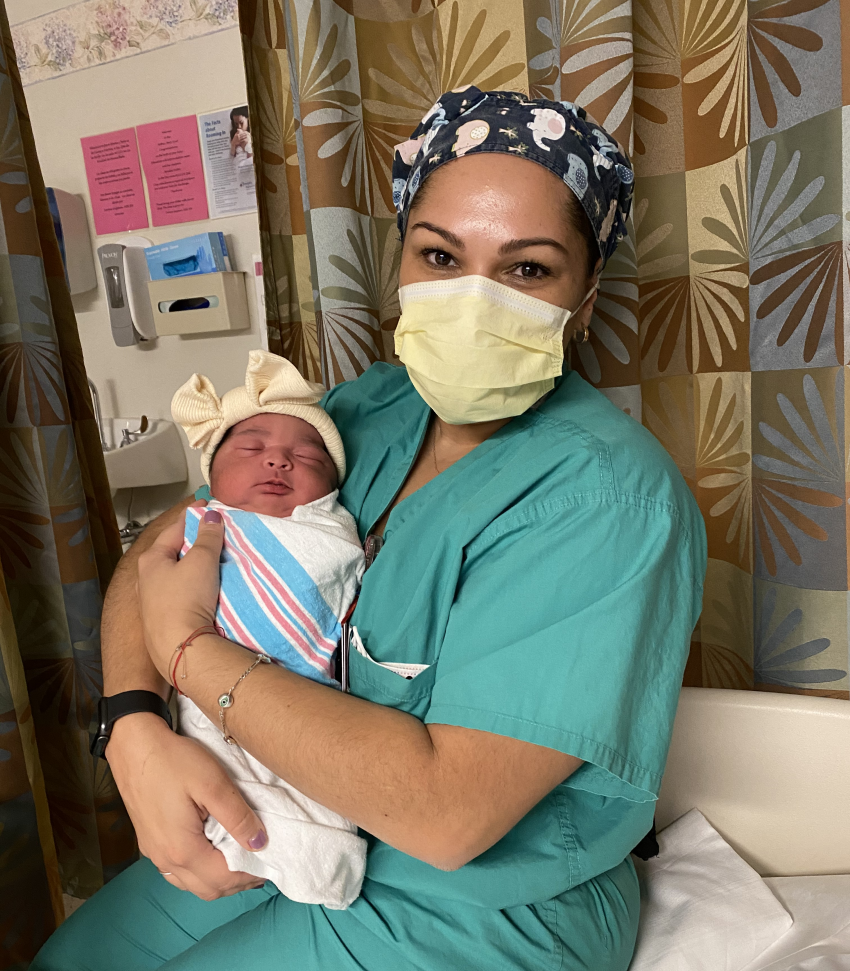Tatiana Gallego was born to work at St. Joseph’s University Medical Center in Paterson, NJ. It’s where she came into this world, one that watched her grow up as a first-generation American citizen in her Colombian family to become a successful government employee with two master’s degrees.
The third was the charm.
“I just love watching babies be born,” says Gallego of her decision to turn to nursing through the Master’s (Entry into Nursing) Program at the Johns Hopkins School of Nursing. “I was a doula before I joined the Johns Hopkins School of Nursing.”
But more than that, Gallego was determined to serve communities and families on the fringe. To her, there are few more vulnerable communities than pregnant women, especially those who come from marginalized groups. “They’re in labor; in the hospital; maybe everything hasn’t been explained because the doctor is too busy.” Or they don’t speak the language. Gallego, who spoke Spanish and English at home, builds trust and a rapport with her patients, and the vulnerability and fear subside.
“Spanish is one of the most common languages spoken around the world! That’s one of the reasons I decided to become a nurse. When my aunt was dying, and in home hospice, we couldn’t get a Spanish-speaking nurse to come to my house. At Johns Hopkins, they drilled that in. We talked all the time about ‘cultural competency.’ Johns Hopkins teaches you: patient first. Every patient is different. Treat the patient, not the illness. And they should never be stigmatized.”
And Gallego grabbed the bull by the … stirrups.
“I took every opportunity Hopkins gave me to me more involved with pregnant people, all types. [Birth Companions doesn’t discriminate based on economic status.] It gave me a different level of confidence when thinking about birth.”
Though the idea of having babies herself is just a twinkle in her eye right now, Gallego says, “when the time is right” she hopes to have them at St. Joe’s, and she’s hoping for a nurse just like her. It’s why she’s taken so well to a role as a preceptor. “Anytime there are nursing students on the floor, I say, ‘I’ll take them!’ ” She feels her experiences, and her Johns Hopkins training, let her offer something different to these students.
On a particularly good day at St. Joe’s, she might have only one pregnant patient. But that’s not all she does. As well as lending a hand to her labor and delivery colleagues, Gallego is the public health nurse for the city of Passaic, handling vaccines and, until recently, lead poisoning cases. (She has been a vaccination specialist all during the COVID outbreak.) “It’s just another opportunity to serve low-income populations.”

Still, the babies take precedence. “When a patient says, ‘I didn’t want to call you. I know you’re busy,’ I say, ‘Girl, it’s just you and me today. Let’s make this happen.’ ”
And if it doesn’t—if the baby comes when Gallego is off her shift—she’s disappointed, but always one of the first to welcome the newborn the next day. “I talk to the baby: ‘Kenny, if you’re ready to come out, come out, and I’ll meet you upstairs tomorrow.’ ” And the mothers play favorites too. “Some patients will wait until I’m back on shift to give birth. It’s crazy.”
Probably not. — Steve St. Angelo
Click here to learn more about the programs at the Johns Hopkins School of Nursing.
Go to unitedstatesofnursing.org to see more stories in The United States of Nursing.

 Birth Companions Talk Doulas and Maternal Health with Mayor Brandon Scott
Birth Companions Talk Doulas and Maternal Health with Mayor Brandon Scott Earth Day: An Opportunity to Address the Environmental Injustice of Plastic Pollution
Earth Day: An Opportunity to Address the Environmental Injustice of Plastic Pollution Forging Policy: How Can Doulas Improve Black Maternal Health?
Forging Policy: How Can Doulas Improve Black Maternal Health? No. 1 Rankings for the School of Nursing and a Pipeline to the “Best Jobs”
No. 1 Rankings for the School of Nursing and a Pipeline to the “Best Jobs” Global Service Learning: Guatemala
Global Service Learning: Guatemala



